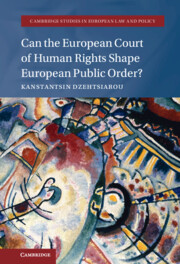Book contents
- Can the European Court of Human Rights Shape European Public Order?
- Cambridge Studies in European Law and Policy
- Can the European Court of Human Rights Shape European Public Order?
- Copyright page
- Dedication
- Contents
- Brief Contents
- Series Editors’ Preface
- Acknowledgements
- Table of Cases
- Abbreviations
- 1 Introduction
- 2 European Public Order in the Case Law of the European Court of Human Rights
- 3 Defining European Public Order: An Impossible Task
- 4 The Function of the European Court of Human Rights
- 5 Institutional Infrastructure of the European Court of Human Rights and Its Ability to Shape European Public Order
- 6 Views of the ECtHR Judges on Their Role in Shaping European Public Order
- 7 Conclusion
- Appendix List of Judges Approached to Be Interviewed for This Monograph
- Index
6 - Views of the ECtHR Judges on Their Role in Shaping European Public Order
Published online by Cambridge University Press: 25 November 2021
- Can the European Court of Human Rights Shape European Public Order?
- Cambridge Studies in European Law and Policy
- Can the European Court of Human Rights Shape European Public Order?
- Copyright page
- Dedication
- Contents
- Brief Contents
- Series Editors’ Preface
- Acknowledgements
- Table of Cases
- Abbreviations
- 1 Introduction
- 2 European Public Order in the Case Law of the European Court of Human Rights
- 3 Defining European Public Order: An Impossible Task
- 4 The Function of the European Court of Human Rights
- 5 Institutional Infrastructure of the European Court of Human Rights and Its Ability to Shape European Public Order
- 6 Views of the ECtHR Judges on Their Role in Shaping European Public Order
- 7 Conclusion
- Appendix List of Judges Approached to Be Interviewed for This Monograph
- Index
Summary
The views of the ECtHR judges influence the interpretation of the European Convention on Human Rights (ECHR) and are also crucial for resolving the existential questions of the Court’s functionality and development. The practice of the ECtHR is such that the individual views of the judges are rarely explicitly expressed in the judgments. The voices of individual judges can be identified from their dissenting and concurring opinions but, even then, their views are often expressed in relation to particular cases and rarely cover broad theoretical questions. This chapter predominantly listens to the voices of the ECtHR judges; it is based on a set of interviews with the sitting judges. The preliminary observation is that these voices are not singing in ‘unison’; they are quite ‘polyphonic’, competing with and contradicting each other. However, this is not surprising and does not make discovering and analysing the views from the bench any less interesting or useful.
- Type
- Chapter
- Information
- Publisher: Cambridge University PressPrint publication year: 2021

